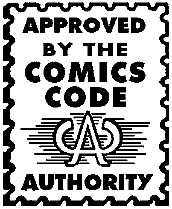Good Riddance, Comics Code
 I am the first to admit that parenting is a ridiculously tough job. It’s a task that is both Sisyphean and Herculean. It’s a Gordian knot and even when it goes well, it’s often a Pyrrhic victory. What I’m saying is, it’s hard on a Greek level. It’s the most important job I have, and I never feel completely satisfied with my performance. But as difficult as parenting is, I resent it when other people try to do it for me.
I am the first to admit that parenting is a ridiculously tough job. It’s a task that is both Sisyphean and Herculean. It’s a Gordian knot and even when it goes well, it’s often a Pyrrhic victory. What I’m saying is, it’s hard on a Greek level. It’s the most important job I have, and I never feel completely satisfied with my performance. But as difficult as parenting is, I resent it when other people try to do it for me.
So I get angry when parent groups try to influence what can be shown on TV, or when a particular religious group protests a movie that they find offensive. Or when a stuffy psychiatrist from the fifties tells me what can and can’t be put in a comic book.
In 1954, a psychiatrist named Fredric Wertham wrote a book called Seduction of the Innocent, in which he blamed comic books for juvenile delinquency. At the time, crime and horror comics were really popular, and Wertham objected to what he felt were excessively violent and sexual images in these comics. His book caused enough of a stir that comics publishers established the Comics Code Authority. This way, they could self-regulate in hopes of avoiding government regulation.
The original rules laid out by the CCA were extremely restrictive. Comics published under the code were not allowed to include any violent or sexual imagery (and remember, the standards were much stricter then; I have a feeling that if Fredric Wertham laid eyes on almost any modern comic, he’d faint dead away). Crime always had to be portrayed in a negative light, and good always had to triumph over evil. No sin could go unpunished within a story. And some rules were just bizarre. For instance, the words “horror” and “terror” could not be used in a comic’s title, and certain concepts, like vampires and werewolves, could not even be mentioned. There is a famous anecdote about a writer named Marv Wolfman who found a loophole in this rule when he used his own name within the narration of his story (the tale had been told by a “wandering Wolfman”). However, this did lead to comic creators being given credit for their work, which was not a common practice previously, so maybe some good came of the code after all.
The Comics Code did change with the times, but it was always unnecessarily restrictive. Eventually, publishers stopped using it, first by creating “mature” imprints (Marvel’s Epic and DC’s Vertigo) that eschewed the code, and later abandoning it completely. Marvel dropped it in 2001. DC and Archie, the last companies to publish titles under the code, stopped using it this year.
And it’s about time. It boggles my mind that a relic like that would still exist, even in a reduced form, in 2011. These days, the average comic book reader is in their late twenties, so juvenile delinquency hardly seems like a concern any more. And what’s the point of applying such antiquated standards to one medium when every other moved past them years ago. I guess you can chalk it up to inertia. It had just been going on for so long that it was easier to keep on keeping on.
Unfortunately, there will probably always be someone trying to tell us what we shouldn’t be reading or watching or playing. I’m not opposed to rating systems, such as the one used by the video game industry, or that Marvel and DC have now adopted. But I do question their usefulness. They are intended to inform parents of the appropriateness of a work’s content. But the criteria for that determination are pretty subjective. I’d rather just have a codified list of potentially objectionable items, such as “explicit sex,” or “graphic violence.”
But even that is no substitute for actually paying attention to what media your kids are consuming. If a parent is upset because their child saw something that they feel is inappropriate on a TV show, the show is not really the problem. We can’t expect the world to be child-proofed. There are sharp edges out there. I think we do a greater service to our kids by teaching them how to avoid them, or if all else fails, getting them a helmet. Um… I’m afraid that metaphor may have gotten away from me, but you get the point: we should monitor what our kids consume, not what creators create.


I couldn’t agree with you more!
You’ve pretty much summed up my feelings on the code.
I mostly disagree.
By all means parents need to be involved. But there is such a thing as innocence to be protected, there are different developmental stages, and a gradual introduction to ‘the world’ is prefered when the child has developed critical reasoning particullarly with respect to messages and their methods.
We might nitpick specifics of the CCA or other standard, but to throw out the concept of all standards goes too far and invites besieging by barbarians. I get angry when publicly owned airwaves are used by TV execs to polute. One org you apparently disagree with is http://www.parentstv.org .
As a parent myself, I certainly agree that kids should be protected. I just think that that responsibility falls on the parents, and not on society as a whole. I do support certain regulations that help parents make informed decisions, such as a voluntary rating system, or even rules about when and where certain material can be viewed. For instance, I think it makes sense to limit adult-oriented programing to the evening hours, and to require that adult magazines be kept out of children’s sight in a book store. But I will not go so far as to say that adult-oriented material should not be produced, or that it should not be easily available to those who want it.
You use the word “pollute,” which is a pretty emotionally charged word in this context, and demonstrates how subjective the concept of “appropriateness” is. Chances are that I would have no problem with some material that you consider inappropriate, and vice versa. So how can we have any single body create a set of guidelines about what can and cannot be put in comics or on TV?
Regarding the organization you mentioned, the Parents Television Council, I think that some of what they do is fine. They are a useful resource for like-minded parents, helping them to be aware of the content of certain shows and providing advice for how to monitor children’s media exposure. But they also lobby networks and the FCC to control what is aired on TV, and I can’t support that. If you don’t like a certain show, just don’t watch it. You don’t have to get it taken off the air.
I understand that we can’t be with our kids every moment of the day, but we have lots of tools at our disposal. Televisions have been required to include V-Chip technology for years (though only a small percentage of parents actually use it). My cable box also gives me the ability to block certain channels or programs, and I assume that this is a common feature. For internet use, there are dozens of products that block access to adult sites.
Finally, I want to make it clear that there definitely is material that I do not think is appropriate for children. I have tried to be very cognizant of what my daughter is exposed to, and there have been many times that I have shielded her from movies or TV shows that I didn’t want her to see. I just feel that it’s my job to make that determination and to enforce it, and no one else’s.
And by the way, Technical, I appreciate your point of view. Parenting is such a personal and emotionally-charged subject, it can be so easy for any discussion of the topic to devolve into a fight. Thanks for sharing your thoughts!
The worst of things I could describe on TV I find few other words for than pollute. Since you find some limits acceptable, I expect we might have some commonality there. However, given the present and ongoing violation of what used to be the safe evening TV time, your asertion that certain programs ought to be on later seems, well, weaker than your railing at previous restrictions. In other words, you say you agree with me in principle, it just seems like you can’t actualy find any current examples to fight against.
The PTC, has done a report showing the ineffectiveness of the V-Chip, which is partialy due to the poor job of self rating that the shows do. The parent can’t block language if the show does not list language when language is actualy there. And the PTC has shown that those self-ratings are negligently inadequate. In short, the usefull V Chip is a canard used to continue to avoid responsibility and government regulation.
Another argument I’ll dismiss is the idea that if a parent controls what their kids watch, then there is no harm. Really? So all of the other kids on the block can learn that perverse sex is normal and become desensitized to graphic violence, and that has no effect on anyone else? Advertising works. It is ridiculous to then claim that the other 50 minuts of the hour have no impact.
Society used to have some common values with respect to decency. I suspect there is still a core of that around, and for such, places like the PTC can give voice to match the monied TV corporations who now fight in courts for the right to air any words at any time in front of any audience on publicly owned airwaves. I’d prefer for TV corporations to self regulate, and to work responsibly as partners with parents. But they are not. TV execs can air anything on cable or late at night, yet they insist that to be free they must invade the family hour with whatever they want. They use the word free, but they mean licentious. Free used to be understood as still having duties and responsibilities; having the freedom to choose and create amongst anything that was good.
Tollerance when it comes to matters of taste is a virtue; when it comes to matters of right and wrong it is not. I have already found my point where things cross over. I wonder if you will. Interestingly, often when the PTC informs advertisers of the content they support, they recognize it does not match their values or desired image and they change where those dollars go. I’m not sure why you are SO opposed to that, or the existing laws that the PTC asks simply be enforced. Besides, in an anything goes world, why does only one voice earn your scorn?
Let me point out three things that you said that I think really illustrate my problem with your position:
My problem is this, Technical: You use words like “perverse,” “decency,” and “right and wrong” as if they were completely objective terms, and yet they are not. But because you believe that your ideas about what is perverse and what is decent are the only right ones, and everyone who disagrees is wrong, you think that you can enforce your standards on everyone else. Who gave you that right?
You also said this:
You’ve found your point, but that doesn’t mean that it’s mine, or anyone else’s. I suggest you raise your kids in the way that you feel is best, and leave “all the other kids on the block” alone. I think their own parents would appreciate it.